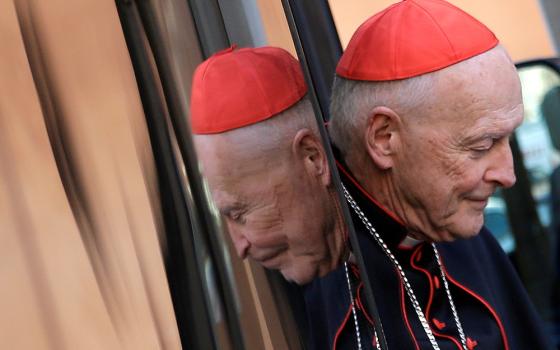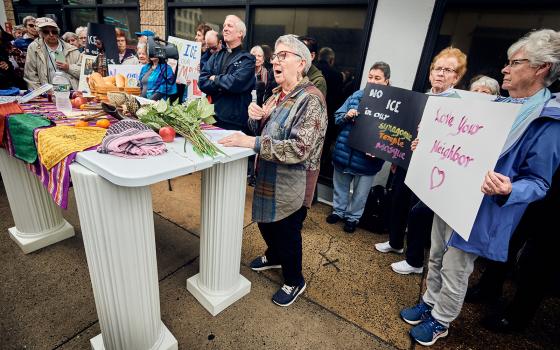
Commentary
This Thanksgiving comes one week after the United States bishops released a document that, among other things, condemned same-gender marriage and three weeks after the bishops helped defeat marriage equality in Maine. Friends often ask how I remain Catholic. I respond that there are millions of reasons that I am thankful to be a Catholic—and not a Catholic bishop.
On Nov. 3, Maine suffered a profound setback in its march towards marriage equality for its state’s citizens. The loss came after Maine’s Catholic diocese waged a lengthy and costly battle against the rights of lesbian, gay, bisexual and transgender (LGBT) people to have the same legal protections as heterosexual couples. The state’s Commission on Governmental Ethics and Election Practices has since revealed that the Diocese spent $553,608.27 on the campaign. Nearly half of the funds came not from anti-gay parishioners in Maine, but from anti-gay Catholic bishops around the country. (See the NCR story here.)
Fifty-seven different bishops ranging from the Diocese of Phoenix to the Diocese of Pittsburgh contributed money, either personally or under the auspices of the diocese or a diocesan fund, to the Catholic Diocese of Maine’s campaign against marriage equality.(To see if your diocese gave money to defeat marriage equality, click here.)
But while certain bishops are contributing money to defeat the potential for all families to have equal protections under law, many Catholic laity are exemplary in their espousal of equality. In fact, of all Christian denominations, Catholics are the most favorable toward LGBT acceptance in the U.S. with 58% of Catholics believing that homosexuality should be accepted by society (Public Religion Research, 2008).
And while Catholics overall are evenly divided on the question of marriage equality with a provision for religious exemptions, in a few short years that is certain to change. The youngest generation of Catholics between 18 and 29 years of age are 60 percent in favor of full marriage equality (Public Religion Research, 2008). And the corresponding numbers across other generations are also growing.
The bishops know this and are struggling to promote their narrow vision of marriage. Last week the U.S. Conference of Catholic Bishops issued a “pastoral letter” on marriage that was anything but pastoral.
Instead of looking at the very real problems modern couples face, such as economic hardship, lack of health care and other obstacles to a healthy and life-giving union, the bishops decided to condemn practices that in their minds lead to the degradation of heterosexual marriage such as contraceptive use and same-gender marriage, among other things. Although one wonders from where the bishops are drawing their conclusions: Massachusetts, the first state to legalize same-gender marriage, was recently found to have the lowest divorce rate of any state!
While the bishops attempt to impose their circumscribed views on Catholics, most of the faithful have made up their own minds on these issues. The majority of Catholics believe that the final moral authority on beliefs about gays and lesbians rests not with the bishops, but with their own conscience. In 1987, 26% of the Post-Vatican II Generation felt that the bishops had the final moral authority on the question of “homosexual behavior.” By 2005, the number had dropped to a mere 19% (American Catholics Today, 2007).
Perhaps even more surprising is the shift happening among the Pre-Vatican II Generation. During the same time period, 13% of the oldest generation of Catholics changed their views so that now only 33% believe that the bishops hold the final moral authority on attitudes towards gays and lesbians.
Just this week I saw firsthand the way that the bishops’ pastoral, while devastating, does not reflect the growing sentiment of equality that is held by the majority of Catholics. I received a call from a campus minister in Ohio who was trying to find a welcoming Catholic Church for a young bisexual woman who was headed home to Iowa. Our office was able to put her in touch with a local chapter leader so that the young woman would be able to find a faith community she could call home. While the bishops may issue a “pastoral letter” every now and again, millions of other Catholics are being pastoral each and every day.
When one stops gazing only at the 258 active Catholic bishops, but instead takes a good look at the approximately 65 million Catholics in the United States and their growing acceptance of lesbian, gay, bisexual and transgender people, there emerges much hope for the future of our church and society.
So this Thanksgiving, I am proud to call myself Catholic and I am counting my reasons: all 65 million of them.
[Nicole Sotelo is the author of Women Healing from Abuse: Meditations for Finding Peace, published by Paulist Press, and coordinates www.WomenHealing.com. A graduate of Harvard Divinity School, she currently works at Call To Action.]




